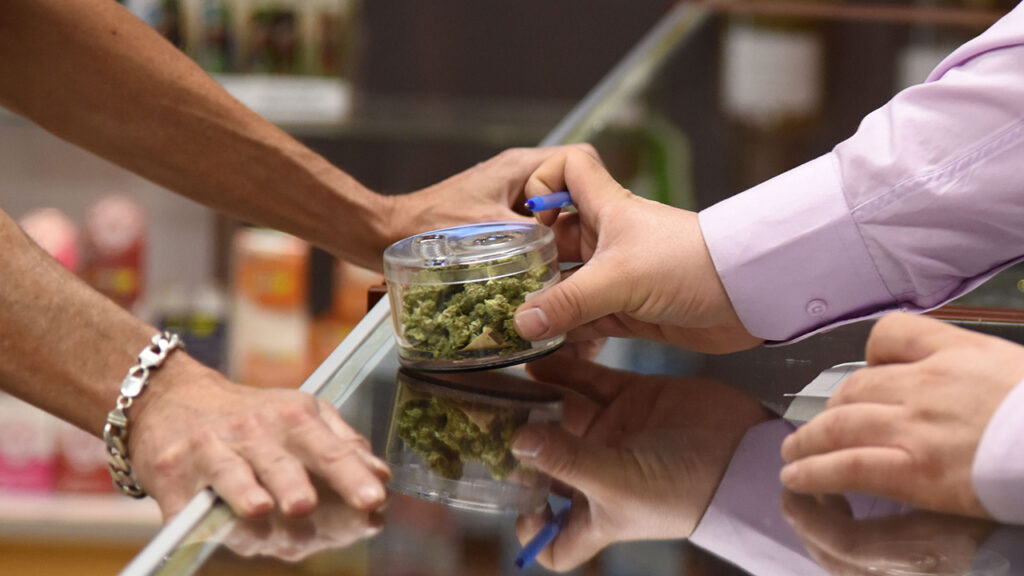The use and possession of marijuana is illegal under U.S. federal law, but in recent years a growing number of states have legalized the drug for medical or recreational purposes. The changing legal landscape has coincided with a dramatic increase in public support for legalization, which a majority of Americans now favor.
Here are seven facts about Americans’ views of and experiences with marijuana, based on Pew Research Center surveys and other sources.
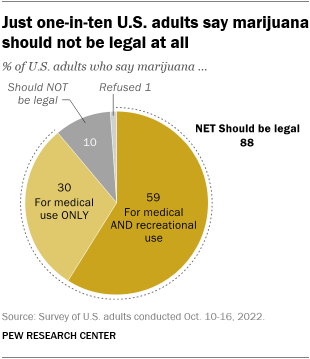
Around nine-in-ten Americans say marijuana should be legal for medical or recreational use, according to an October 2022 Pew Research Center survey. An overwhelming majority of U.S. adults (88%) say either that marijuana should be legal for medical and recreational use (59%) or that it should be legal for medical use only (30%). One-in-ten say the drug should not be legal in any form. These views have held steady since April 2021.
Public support for marijuana legalization differs widely by age, political party, and race and ethnicity. Adults ages 75 and older are far less likely than younger adults to support marijuana legalization for both recreational and medical purposes, according to the October 2022 survey. Just three-in-ten adults 75 and older say marijuana should be legal for recreational and medical use, compared with 53% of adults 65 to 74, the next youngest age category. By contrast, 72% of adults under 30 support legalization for medical and recreational use.
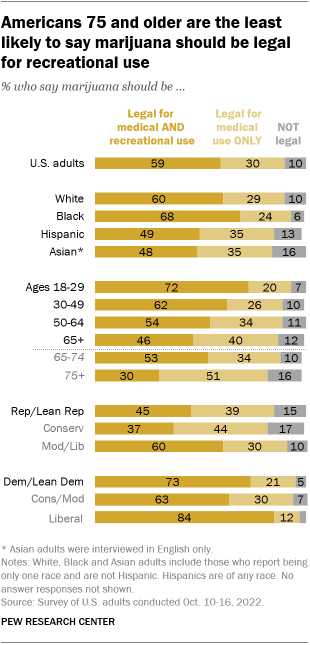
Democrats and Democratic-leaning independents are more likely than Republicans and GOP leaners to support the legalization of marijuana for both purposes (73% vs. 45%).
Majorities of Black adults (68%) and White adults (60%) say marijuana should be legal for medical and recreational use, compared with smaller shares of Hispanic (49%) and Asian Americans (48%).
Supporters and opponents of marijuana legalization have cited different reasons for their views, according to a Gallup survey conducted in 2019. Americans who favored legalization were most likely to cite two reasons as very important: marijuana’s perceived medical benefits (86%) and the idea that legalizing the drug would free up law enforcement to focus on other types of crime (70%).
Among Americans who opposed marijuana legalization, 79% said a very important reason was that it would increase the number of car accidents involving drivers who use marijuana. Around seven-in-ten (69%) said a very important reason was that legalization would lead to more people using stronger and more addictive drugs.
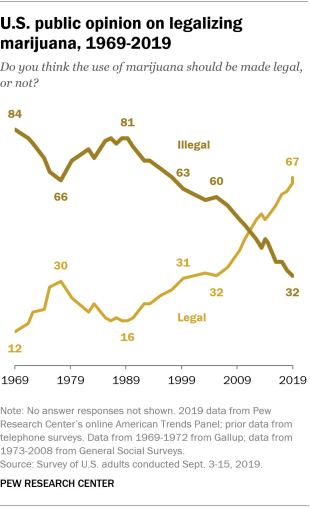
Support for marijuana legalization has increased dramatically over the last two decades. In addition to asking specifically about the medical and recreational use of the drug, the Center previously asked Americans about legalizing marijuana use in general. In 2019, the last time the Center asked that question, two-thirds of adults expressed support for marijuana legalization, more than double the share who said they favored legalization in a 2000 Gallup survey.
Fewer than half of U.S. adults (46%) say they have ever used marijuana, according to the 2021 National Survey on Drug Use and Health. That is lower than the shares who say they have ever consumed alcohol (78%) or ever used tobacco products (57%).
While many Americans say they have ever used marijuana, far fewer are current users, according to the same survey. In 2021, 19% of U.S. adults said they had used marijuana in the past year, while 13% said they had used it in the past month.
Most Americans support easing penalties for people with marijuana convictions, an October 2021 Center survey found. Two-thirds of adults say they favor releasing people from prison who are being held for marijuana-related offenses only, including 41% who strongly favor this. And around six-in-ten adults (61%) support removing or expunging marijuana-related offenses from people’s criminal records.
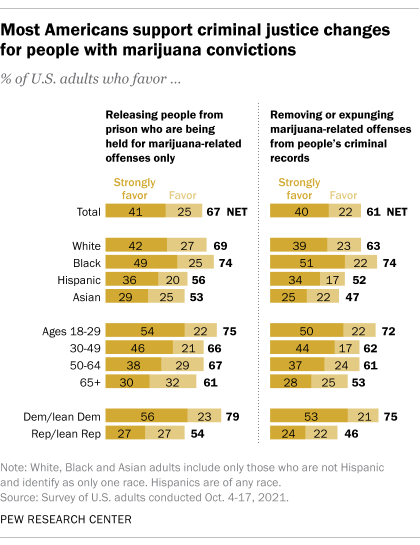
Younger adults, Democrats and Black Americans are especially likely to support these changes. For instance, around three-quarters of Black adults (74%) favor releasing people from prison who are being held only for marijuana-related offenses, and just as many favor removing or expunging marijuana-related offenses from criminal records. Black Americans are more likely than people of other racial or ethnic backgrounds to favor these changes.
Twenty-one states and the District of Columbia have legalized small amounts of marijuana for adult recreational use as of April 2023, according to the National Organization for the Reform of Marijuana Laws (NORML), an advocacy group that tracks state-level legislation on the issue. Some 48% of Americans now live in a jurisdiction where recreational marijuana is legal, according to a Center analysis of 2022 population estimates from the U.S. Census Bureau. Still, earlier this year, voters in Oklahoma rejected a proposal to legalize the drug for recreational purposes. In addition to 21 states and D.C., the U.S. Virgin Islands, Guam and the Northern Mariana Islands have passed legislation legalizing marijuana for recreational use.
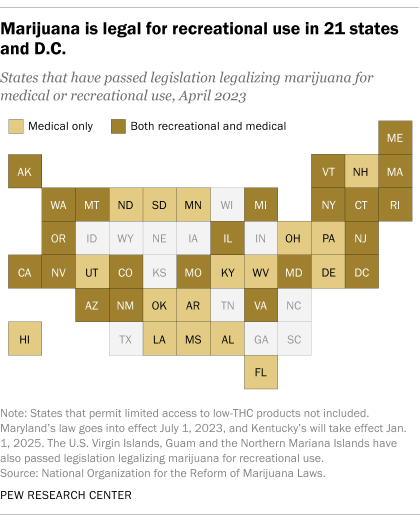
Separately, more than three dozen states – as well as D.C. – have approved some form of medical marijuana program. In March, Kentucky became the most recent state to pass legislation that will legalize the drug for medical purposes. Americans living in places with a medical marijuana program account for roughly three-quarters of the country’s population (74%). Guam, Puerto Rico, the Northern Mariana Islands and the U.S. Virgin Islands have also passed medical marijuana laws.
Numerous states have also enacted laws reducing criminal penalties for certain marijuana-related convictions or allowing past convictions to be expunged.
You can view the whole article at this link 7 facts about Americans and marijuana

